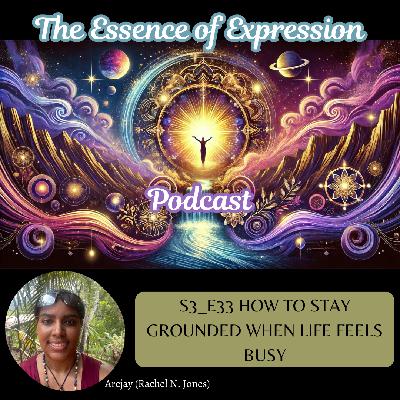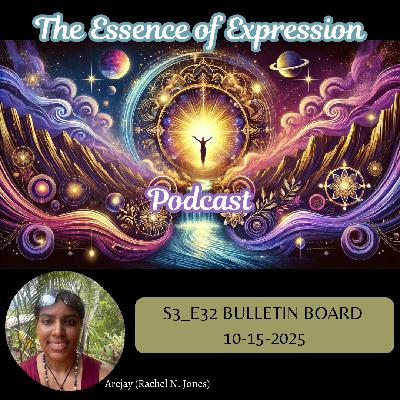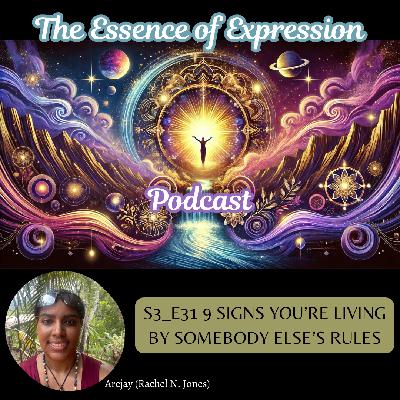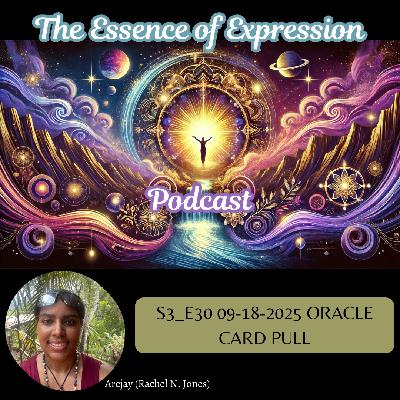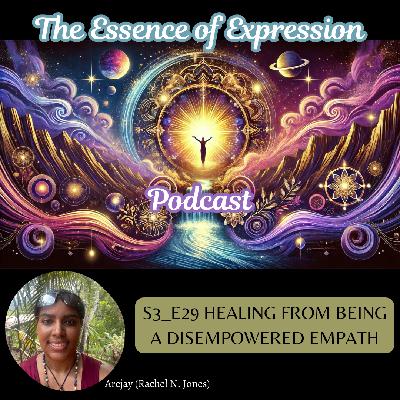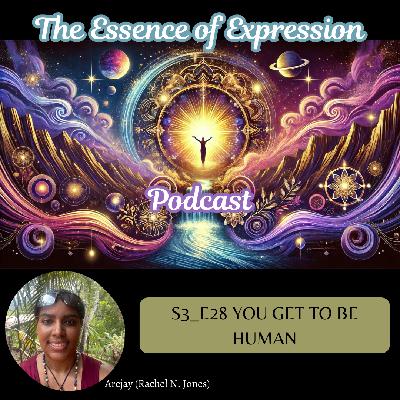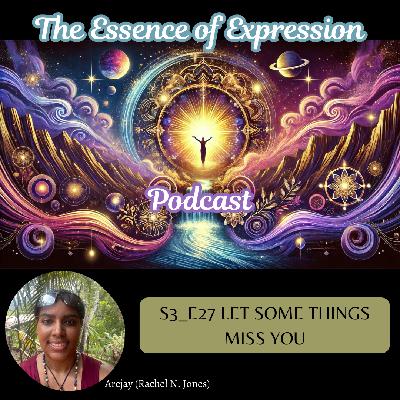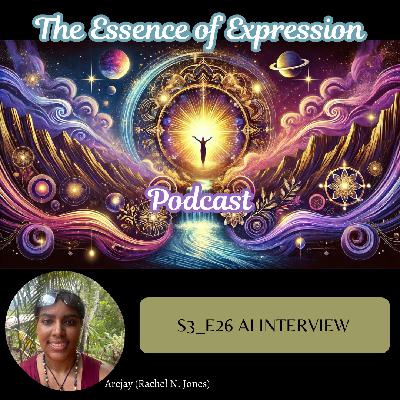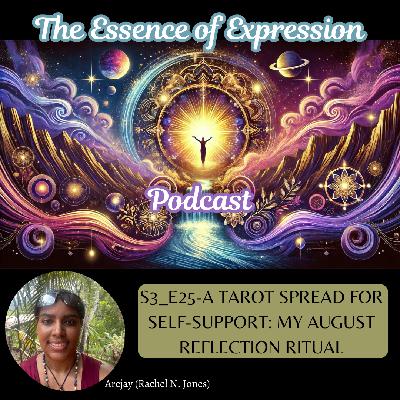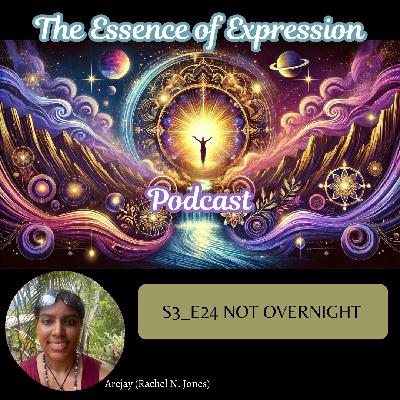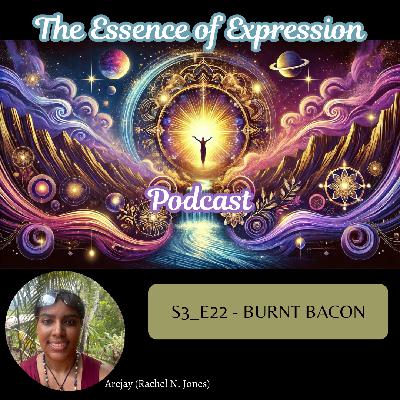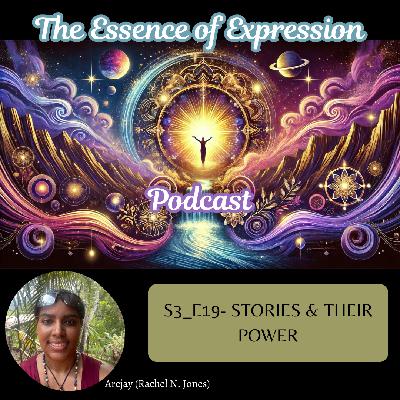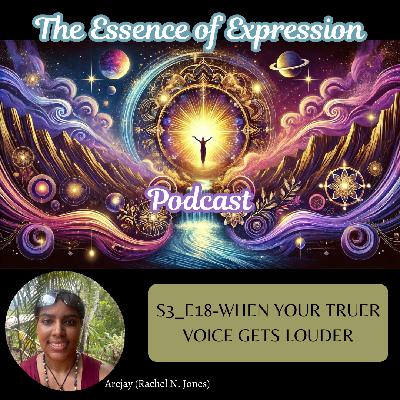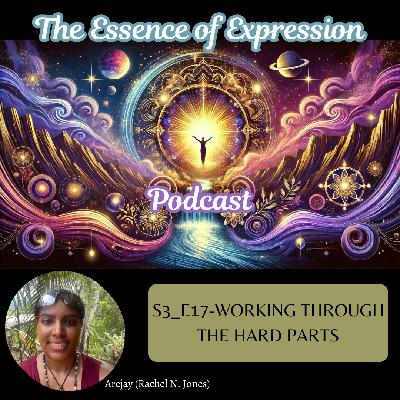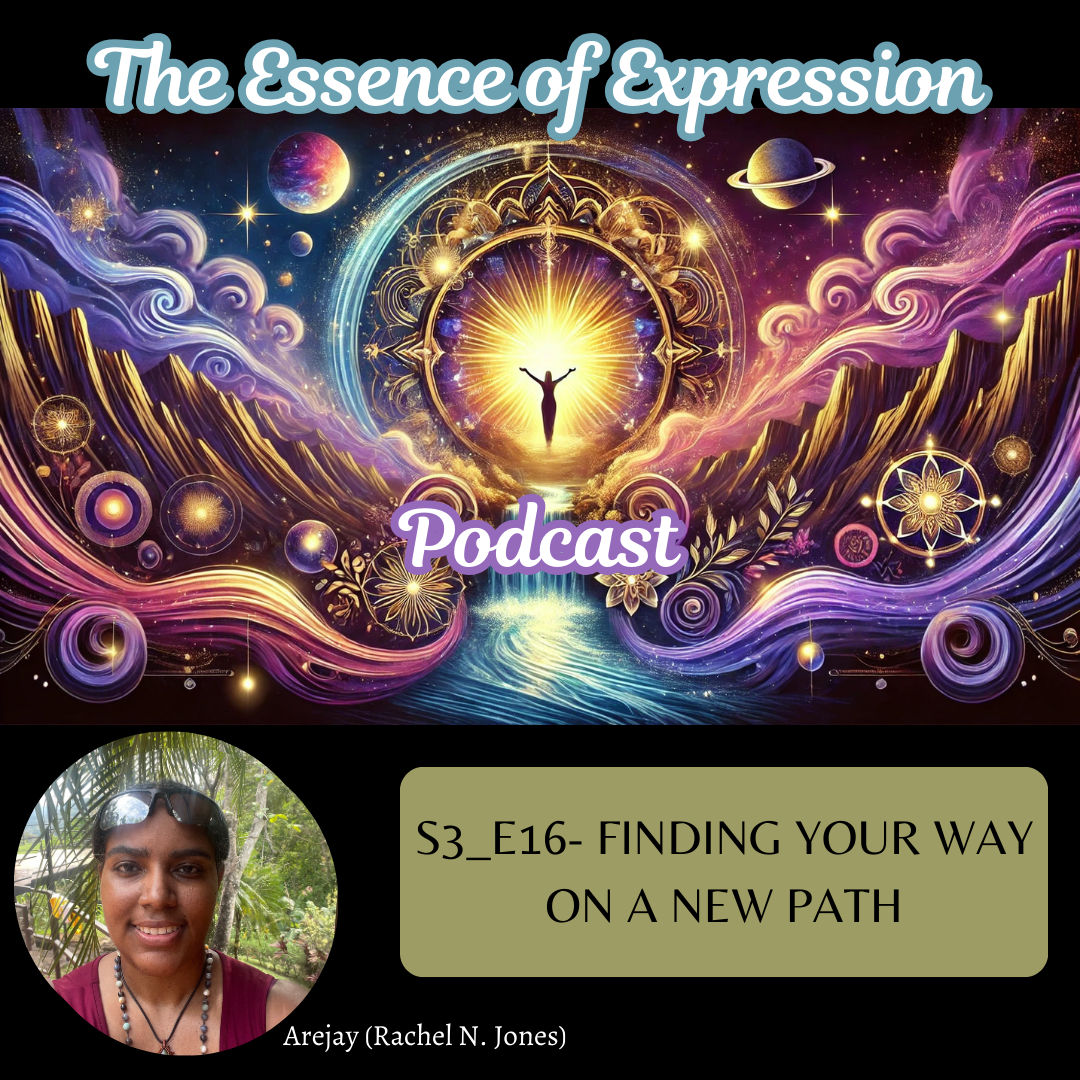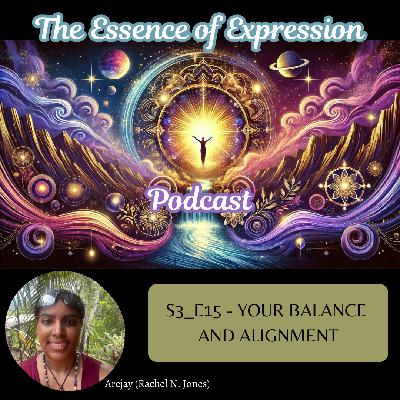Discover The Essence of Expression
The Essence of Expression

The Essence of Expression
Author: Arejay (Rachel N. Jones)
Subscribed: 1Played: 0Subscribe
Share
© Arejay (Rachel N. Jones)
Description
Sharing insights and things to ponder about this crazy amazing thing called life. From spirituality to cooking hacks to healing to new developments in tech and a bunch of other topics I haven't yet considered. This is a beautiful experiment in expression and we'll take this journey together.
130 Episodes
Reverse
In this episode, Arejay shares simple, practical ways to stay grounded when life feels busy. She explains how starting with the exhale helps calm the nervous system, and why honoring your body's needs and reestablishing grounding routines—like a roots meditation—can bring you back to center. Arejay also encourages brain dumping to clear mental clutter, slowing down intentionally, and setting realistic expectations to ease the pressure of constant busyness. She closes by reminding listeners of the power of community and support in maintaining balance.
Thank you for helping us reach over 1,000 downloads. This episode is just a sharing of messages that people need to hear and I'm trusting it'll find its way to them in perfect timing. If you identify as any of these, take some time to listen. 1) Intuitive/highly sensitive 2) You don't quite fit though you're never an outsider 3) Feel stuck even though you're capable and put in the work Note: Here's where you can find the neurodivergence episode I mention.
Ever feel like you're living a life that doesn't quite feel like your own? In this powerful episode, Arejay uncovers the subtle signs that you may be following someone else's rules instead of your own. If you've been questioning your choices, feeling stuck, or craving more meaning, this conversation invites you to reflect, realign, and take the first steps to live more authentically. Tune in for key insights that can help you reclaim your path and create a life that truly reflects who you are.
Arejay pulls cards from the Mystical Shaman Oracle Card Deck, asking these four questions: 1) What is happening right now? 2) What do we need to know? 3) What can we do? 4) How can we be supported? Note: card readings are for entertainment purposes only and always subject to interpretation. They are not substitutes for advice from a qualified professional. Listeners are solely responsible for any decisions made or actions taken and their consequences. The Essence of Expression, Arejay (Rachel N. Jones) assumes no legal liability for damages, losses, or other consequences of the listener's decisions following the reading.
In this episode, Arejay shares the powerful journey of transforming from a disempowered empath into an empowered empath. Through a four-step healing process: Learn to manage energy Release the absorption story Stop claiming emotions Work with emotions as messengers This episode is both a deeply personal story and a roadmap for empaths ready to move from survival to sovereignty.
If you've ever felt stuck, wobbly, or like you should "have it all together by now," this episode is your reminder that the mess is where the magic happens. In this raw and encouraging episode, speaking directly to entrepreneurs, leaders, and anyone navigating growth, Arejay reminds us that perfection isn't the goal—being human is. With honesty and humor, she touches on: Why being seen in your struggles makes you more trustworthy, not less Shattering that feeling of "knowing nothing" because you're figuring something out The importance of adjusting, growing, and embracing imperfection as part of leadership Arejay encourages leaders to embrace their imperfections and seek help when needed. She highlight the value of relatability and practical experience over theoretical knowledge. Arejay also offers support through tarot readings and human design coaching
Arejay emphasizes the importance of letting some things miss you to avoid burnout and paralysis from overconsumption. She shares a personal experience and highlights the necessity of discernment to allocate time and attention effectively. The conversation underscores the value of self-awareness and strategic time management.
Arejay shares their experience with an AI interview, expressing frustration over the lack of an AI-generated avatar and the impersonal nature of the process. She highlights potential issues with delaying human interaction in the interviewing and hiring process. Overall Arejay was not a fan of the experience.
Arejay introduces a nine-card spread for self-reflection and guidance, inspired by Jennifer Kohler's August 2025 monthly forecast call. The spread includes questions like "What is top of mind?" and "What underlying belief is present in this want?" Arejay emphasizes flexibility and intuition, suggesting listeners adapt the spread if they feel guided to do so. The process involves pulling cards from multiple decks, if desired, and interpreting them intuitively before consulting guidebooks. Arejay encourages following inner nudges over rigid adherence to rules and promises to add an option to download the spread PDF on the episode's webpage https://theessenceofexpression.com/episodes/tarot-spread-self-support-august-2025/
Arejay emphasizes the importance of patience and understanding natural rhythms in personal growth. She warns against the impatience that arises from unrealistic expectations and the need for immediate results. Arejay suggests that hitting a wall might be a sign to pause and integrate new information. She advises seeking support and expanding beyond comfort zones. She highlights the non-linear nature of life, encouraging individuals to trust the process and let go of rigid timelines. Arejay reassures that progress is being made and that seeking deeper understanding and stillness can aid in the journey.
Arejay reflects on the concept of Sankofa, emphasizing the importance of learning from the past to build a better future. She shares a personal journey of rediscovering practices that brought her peace and clarity, including energetic cleansing and prayer. This led to insights and breakthroughs, helping her recalibrate from hyperfocusing to a more balanced approach. Arejay encourages others to revisit past lessons and treasures to guide their present actions, ensuring sustainable growth and alignment with their true selves.
Arejay discusses the importance of recognizing and responding to signals that indicate a need to rest, using a personal anecdote about burning bacon as an example. She emphasizes the value of pivoting when necessary and not pushing through when the body or mind is not fully present. Arejay highlights the consequences of ignoring these signs, such as reduced productivity and potential illness. She encourages listeners to pay attention to subtle and more obvious cues that signal a need for a break, suggesting that early recognition can prevent more severe issues. Arejay concludes by affirming that taking time for oneself is a valid need and essential for well-being.
Arejay emphasizes the importance of learning botanical names for those working with plants in healing and wellness. Botanical names eliminate confusion, help us understand plant relationships, often reveal physical characteristics, and help us get the accurate information when looking at the research. Arejay also stresses respectful wildcrafting practices, advising never to take the first, last, or more than half of a plant to ensure sustainability.
Arejay discusses the importance of distinguishing between "cages," "circles," and "communities" in personal and professional growth. A "cage" is a group of people with limited mindsets that may hold you back, often due to fear or jealousy. "Circles" are supportive individuals with broader perspectives who help you progress. "Communities" can contain both, depending on their curation. Arejay emphasizes the need to curate our environments to foster growth, suggesting that while default communities (like family) may offer mixed support, curated communities around shared interests or goals are more likely to be supportive. She advises choosing spaces that nourish personal development and encourages compassion and self-awareness in navigating different relationships.
Arejay discusses the impact of stories on our lives, emphasizing that stories are remembered better than facts and can significantly influence our behavior and perspective. She encourages questioning the origin and truth of our stories, particularly those that limit us. Arejay shares personal experiences and how reevaluating these stories led to personal growth. She advises examining patterns in when we tell empowering or limiting stories and suggests working backwards from our ideal outcomes to create more supportive narratives.
Arejay discusses the importance of making one's truest self louder, inspired by Dr. Becky Kennedy's LinkedIn post. She explains that practicing to amplify this voice leads to honoring personal needs, reducing people-pleasing, and learning to rest before burnout. The concept of "shoulds" is critically examined, urging individuals to question their origins and relevance. Arejay highlights the expansiveness felt when freeing oneself from external expectations and the importance of listening to one's body. Transitions towards authenticity can be rocky but are ultimately worthwhile, leading to a more intentional and aligned life.
Arejay shared tips for working through the hard parts and personal examples of how it's been showing up for her lately. She emphasizes remembrance, acknowledgement, and asking.
Arejay discusses the importance of finding one's path in various life journeys, such as self-care, wellness, and business. She emphasizes the need to understand one's destination and the balance desired in life, represented by an "ideal time pie." Arejay advises seeking guidance from trusted sources, being open to different perspectives, and allowing oneself to experiment and learn from failures. She stresses the significance of self-trust, connection with oneself and possibly a higher power, and the ability to adapt and discern what is right for oneself.
Arejay discusses the concept of balance, emphasizing it as a dynamic process rather than a static state. She argues that balance should be tailored to an individual's natural equilibrium, using the example of body temperature to illustrate personal variations. Arejay critiques the idea of balance as a 50-50 split, suggesting instead that each person's natural ratio should be honored. She explore Human Design charts for personal alignment, noting that tension can be a natural part of alignment. Arejay concludes by encouraging individuals to reflect on their unique balance and alignment; and closes with playing tuning forks.
Arejay discusses the effectiveness of advice, counsel, and mentoring in coaching, emphasizing a blend of all three. Coaching encourages clients to find their own answers, while mentoring involves sharing successful experiences and adapting them to the client. Guidance, often intuitive, provides immediate solutions. Arejay highlights the importance of self-connection and tailoring approaches to clients' needs. High self-awareness clients benefit from coaching to navigate self-imposed obstacles, while self-abdicated clients need guidance to reclaim their decision-making power. The goal is to help clients self-source wisdom, balancing immediate needs with long-term growth.


